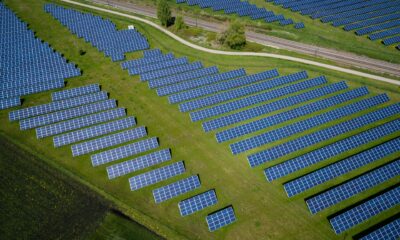Cannabis
Cannabis regulation in Italy remains unclear
Since May 2019 some members of the government in Italy have raised doubts about the validity of the legal cannabis trade in the country. This has left a huge legislative gap which has cast a cloud of uncertainty over Italy’s nascent CBD & hemp industry. There doesn’t appear to be any signs that the Italian courts will clarify the matter soon, so the situation remains unclear in the country.

There is still no clear news about cannabis regulation in Italy. In the last few days, the chairmanship of the joint Constitutional Affairs and Budget Committees of the Chamber of Deputies judged more than 800 amendments to the Milleproroghe to be inadmissible, including regulations for the liberalization of CBD.
The latest CBD & Cannabis updates are now at your fingertips, with notifications and fresh information offered by our companion, the CBD News App. Stay up-to-date with marijuana stocks for investments, global market, cannabis legalization and more. CBD News is a mobile app that focuses exclusively on CBD. It brings you the very latest news in the CBD industry.
The amendment was signed by about 30 parliamentarians from the Democratic Party, the 5 Star Movement, +Europe and Free and Equal. At the end of last year, Prime Minister Giuseppe Conte promised that the square would be found, but for now, there is still nothing concrete.
What’s going to happen
According to insiders, the Milleproroghe was the last hope for clarity. Recent developments leave the fate of the entire sector in doubt. The jobs of 12,000 workers are at stake. It is no coincidence that many companies in the sector have already been forced to close down.
Current estimates indicate that out of 12000 operators, more than 3000 people have already been sent home. Not only that, 600 farms have raised the white flag and ceased operations.
The real drama is for shops: out of 2000 stores distributed throughout the country, more than 1200 have already closed. These people will struggle to find gainful employment as the cannabis industry continues to collapse in Italy.
The regulatory vacuum
From a regulatory point of view, the market and the cannabis sector are regulated by the 242 Law of 2016, which has been questioned several times by many lawyers. The main object of dispute revolves around the fact that this law does not talk about trade, and only about production. This is not useful to producers who will eventually need to sell their product. A bad blow was dealt by the judgment of the Supreme Court of Cassation of 30 May last year.
The ruling states that the scope of applicability of the law on the hemp supply chain – the 242 of 2016, precisely – does not concern the sale of CBD to the public. In short, the marketing of the resins, oils, inflorescences, and leaves that have been obtained from this variety of hemp is not allowed by the law in question.
Supreme Court’s decision
According to the ermines, Law 242 of 2016 indicates that only the cultivation of the permitted varieties is lawful. It is also precise in indicating exhaustively which derivatives may be offered for sale.
Consequently, all other conduct can only constitute actions punishable under the Drugs Act, regardless of whether the THC content is 0.6% lower unless these derivatives are effective without any psychotropic or drug-inducing effect.
The legislative gap
As always, the Supreme Court does not make a judgement on the merits of a case, but only an acknowledgment of the legislative vacuum that characterizes the sector in Italy at this time. It is up to Parliament, at the moment, to intervene to fill the gap, even if it seems that politics does not seem to have much interest in getting its hands dirty.
The crisis also involves farms, which on the one hand have to deal with the costs of greenhouses and rented land and on the other are no longer able to sell their products.
__
(Featured image by Sharon McCutcheon via Unsplash)
DISCLAIMER: This article was written by a third party contributor and does not reflect the opinion of Born2Invest, its management, staff or its associates. Please review our disclaimer for more information.
This article may include forward-looking statements. These forward-looking statements generally are identified by the words “believe,” “project,” “estimate,” “become,” “plan,” “will,” and similar expressions. These forward-looking statements involve known and unknown risks as well as uncertainties, including those discussed in the following cautionary statements and elsewhere in this article and on this site. Although the Company may believe that its expectations are based on reasonable assumptions, the actual results that the Company may achieve may differ materially from any forward-looking statements, which reflect the opinions of the management of the Company only as of the date hereof. Additionally, please make sure to read these important disclosures.
First published in AGRIGENTOOGGIIT, a third-party contributor translated and adapted the article from the original. In case of discrepancy, the original will prevail.
Although we made reasonable efforts to provide accurate translations, some parts may be incorrect. Born2Invest assumes no responsibility for errors, omissions or ambiguities in the translations provided on this website. Any person or entity relying on translated content does so at their own risk. Born2Invest is not responsible for losses caused by such reliance on the accuracy or reliability of translated information. If you wish to report an error or inaccuracy in the translation, we encourage you to contact us.

-

 Crypto5 days ago
Crypto5 days agoTariff Turmoil Sends Bitcoin and Ethereum Lower as Crypto Markets Face Mounting Pressure
-

 Markets2 weeks ago
Markets2 weeks agoMarkets, Jobs, and Precious Metals Show Volatility Amid Uncertainty
-

 Crypto2 days ago
Crypto2 days agoEthereum Outlook: Key $2,190 Resistance, Whale Accumulation, and Buterin’s Push for True DeFi
-

 Cannabis1 week ago
Cannabis1 week agoAI Can Mimic Psychedelic Experiences but Cannot Truly Feel Them, Study Warns

























